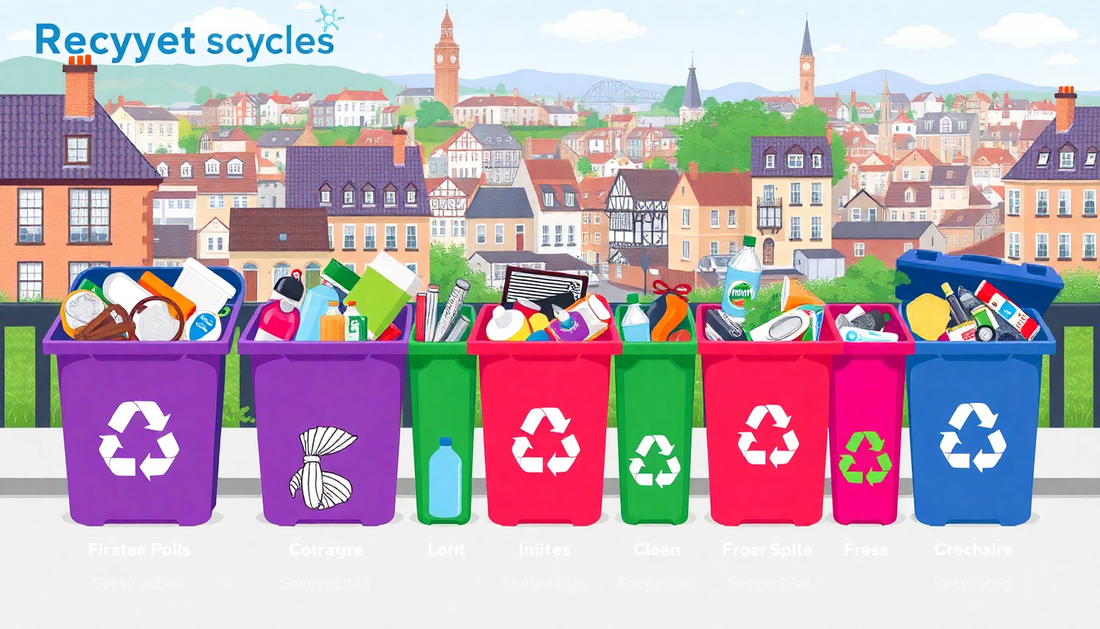In the ever-evolving landscape of environmental consciousness, the United Kingdom has emerged as a leader in the global push for a more sustainable future. At the heart of this movement lies the intricate and multifaceted world of recycling, a crucial component in the nation's quest to reduce its carbon footprint and protect the planet for generations to come.
The UK Recycling System: An Overview
The UK's recycling system is a complex and interconnected network, with local councils playing a pivotal role in its implementation. Each council is responsible for the collection and processing of household waste within its jurisdiction, ensuring that recyclable materials are diverted from landfills and given a new lease on life.
Across the country, households are provided with a variety of collection bins and bags, catering to the diverse range of recyclable materials. From paper and cardboard to glass, plastics, and metals, the UK's recycling system aims to capture as much of this valuable waste as possible, transforming it into raw materials for the manufacturing of new products.
Types of Recyclable Materials in the UK
The UK's recycling efforts encompass a wide array of materials, each with its own unique journey through the recycling process.
Paper and Cardboard
Paper and cardboard, including newspapers, magazines, and packaging, are among the most commonly recycled items in the UK. These materials are collected, sorted, and then processed into new paper products, reducing the demand for virgin resources.
Glass
Glass bottles and jars are another staple of the UK's recycling program. These items are collected, cleaned, and melted down to create new glass containers, contributing to a closed-loop system that minimizes waste.
Plastics
The UK's approach to plastic recycling has evolved in recent years, with a focus on collecting and processing a wider range of plastic types, from bottles and containers to film and packaging.
Metals
Aluminum cans, steel tins, and other metal items are also readily accepted in the UK's recycling stream. These materials are melted down and reused in the production of new metal products, conserving valuable resources.
Organic Waste
In addition to traditional recyclables, the UK has also made strides in the collection and processing of organic waste, such as food scraps and garden trimmings. These materials are often composted or used to generate renewable energy, further reducing the burden on landfills.
The Recycling Process: From Collection to Remanufacturing
The journey of recyclable materials in the UK is a multi-step process, involving collection, sorting, processing, and ultimately, the remanufacturing of new products.
Collection
Local councils are responsible for the collection of recyclable materials from households, either through curbside pickup or drop-off centers. This collected waste is then transported to specialized facilities for further processing.
Sorting
At sorting facilities, the collected materials are meticulously separated by type, ensuring that each category is properly prepared for the next stage of the recycling process.
Processing
Once sorted, the materials undergo various processing techniques, such as melting, shredding, or pulping, to transform them into raw materials that can be used in the manufacturing of new products.
Remanufacturing
The processed materials are then sold to manufacturers, who incorporate them into the production of a wide range of goods, from paper and packaging to new glass containers and metal products.
Challenges and Innovations in UK Recycling
While the UK's recycling system has made significant strides, it is not without its challenges. One of the primary issues is the problem of contamination, where non-recyclable materials end up in the recycling stream, compromising the quality and value of the collected materials.
Additionally, the lack of consistency in recycling policies across different local councils can create confusion and hinder the overall effectiveness of the system.
However, the UK is actively addressing these challenges through innovative solutions. Advanced sorting technologies, such as automated optical scanners and robotic systems, are being implemented to improve the accuracy and efficiency of the sorting process. Furthermore, initiatives to increase public awareness and participation in recycling are being rolled out, empowering individuals to play a crucial role in the success of the UK's recycling efforts.
The Role of Individuals in UK Recycling
As the UK continues to refine and enhance its recycling system, the role of individual citizens cannot be overstated. By properly separating and disposing of their household waste, citizens can ensure that recyclable materials are channeled into the right streams, minimizing contamination and maximizing the impact of the recycling process.
Moreover, individuals can contribute to the sustainability movement by adopting a more conscious approach to consumption, reducing waste, and reusing items whenever possible. This holistic approach, combined with the efforts of local councils and the recycling industry, will be instrumental in driving the UK towards a more circular economy and a greener future.
Conclusion
The UK's recycling system is a complex and ever-evolving landscape, reflecting the nation's commitment to environmental stewardship and the preservation of natural resources. From the intricate web of local council responsibilities to the innovative technologies and public awareness campaigns, the UK is leading the charge in the global fight against waste and pollution.
As individuals, we all have a role to play in this journey. By understanding the intricacies of the UK's recycling system, embracing sustainable practices, and actively participating in the recycling process, we can collectively contribute to a more sustainable future for our communities and the planet as a whole.

